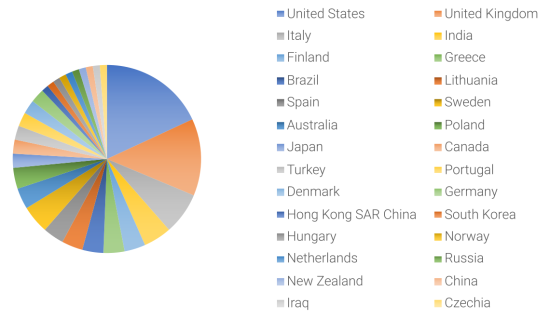Search Articles
Journal:
all
Keyword:
community-based tourism
Total
—
12 articles
Article 31 May 2025
Vassilios Makrakis, Nelly Kostoulas-Makrakis, Omar Ramzy and Mohammed Anwar
Increasing numbers of refugee children enter host countries’ public schools. Yet, most refugee children’s education is carried out through refugee community schools, mainly by unqualified teachers. This study examines critical elements impacting teacher training satisfaction, emphasizing
Increasing numbers of refugee children enter host countries’ public schools. Yet, most refugee children’s education is carried out through refugee community schools, mainly by unqualified teachers. This study examines critical elements impacting teacher training satisfaction, emphasizing instructors’ preparedness and skill, and the effectiveness of training outcomes within a post-graduate program to improve education for refugee children. It supports the Sustainable Development Goals (SDGs), especially SDG10, which calls for lowering inequality, and SDG4, which strongly emphasizes high-quality education. A sizable sample of 306 out of 386 individuals who had finished the RefTeCp capacity-building program participated in the study. These people worked in various educational environments, such as community schools for refugees and private establishments. The study guaranteed its legitimacy through a thorough reliability analysis and content evaluation. Multiple regression techniques were used in data analysis to identify the crucial factors influencing teacher training satisfaction. According to key findings, the efficiency of teaching materials and instructors’ abilities to manage blended learning environments substantially correlate and explain teacher training satisfaction. The study’s results highlight several essential facets of teacher professional development, such as focusing on suitable high-quality blended learning materials and resources to improve refugee students’ learning needs and experiences. Continuing teacher capacity-building interventions, and allowing refugee teachers to participate, can significantly contribute to reducing inequities and, ultimately, to a more equitable and just society.
or
Access Full Article
300 Views64 Downloads
Article 15 January 2025
Michael Tarrant, Mikell Gleason, Steven Boyd and Tony Wellington
We adopt a normative model of crowd tolerance (expressed as a willingness to support more or fewer tourists) as a proxy for overtourism. Consistent with Social Exchange Theory, it is proposed that a person will perceive
We adopt a normative model of crowd tolerance (expressed as a willingness to support more or fewer tourists) as a proxy for overtourism. Consistent with Social Exchange Theory, it is proposed that a person will perceive the impacts of tourism at a destination as positive or negative depending on the extent to which they view visitor levels as under or over a threshold that they expect or support (i.e., their norms or tolerance level). A total of 420 residents and 1048 visitors completed a survey interview in the tourist shire of Noosa between 2022 and 2024. Results show that residents and visitors differed significantly on many of the perceived tourism impacts, with long-term residents less favorable to the positive impacts than visitors. There was broad consensus across both residents and tourists, and the highest level of agreement, with negative impacts (especially that tourism contributes to traffic and parking congestion, and higher prices). The lowest levels of agreement with positive tourism impacts were found for “over tourists” (respondents who supported a fewer number of tourists). Implications for sustainable destination management are discussed in the context of the Quadruple Bottom Line, including efforts that enable tourism communities to grow well using a guardianship ethos and collective action of Gifts and Gains.
or
Access Full Article
Highlights of Sustainability
Volume 4 (2025), Issue 1, pp. 1–15
Volume 4 (2025), Issue 1, pp. 1–15
1147 Views378 Downloads
Editorial 21 December 2023
Highlights of Sustainability Editorial Office
Highlights of Sustainability
Volume 2 (2023), Issue 4, pp. 303–304
Volume 2 (2023), Issue 4, pp. 303–304
1564 Views396 Downloads
Article 22 September 2023
Carlo Berizzi, Margherita Capotorto, Gaia Nerea Terlicher and Luca Trabattoni
Highlights of Sustainability
Volume 2 (2023), Issue 4, pp. 185–206
Volume 2 (2023), Issue 4, pp. 185–206
2529 Views812 Downloads1 Citations
Article 21 July 2023
Nikolaos Partarakis, Effrosini Karouzaki, Stavroula Ntoa, Anastasia Ntagianta, Emmanouil Zidianakis and Constantine Stephanidis
Highlights of Sustainability
Volume 2 (2023), Issue 3, pp. 138–156
Volume 2 (2023), Issue 3, pp. 138–156
2589 Views694 Downloads
Article 14 June 2023
Małgorzata Polkowska
Space tourism is recreational space travel, whether by government vehicles, such as the Russian Soyuz and the International Space Station (ISS), or by vehicles built by private companies. Since the flight of the world’s first space
Space tourism is recreational space travel, whether by government vehicles, such as the Russian Soyuz and the International Space Station (ISS), or by vehicles built by private companies. Since the flight of the world’s first space tourist, American businessman Dennis Tito (28 April 2001), space tourism (orbital) has been slowly growing. Orbital space tourism is very expensive, so a number of private companies have decided to concentrate on building much cheaper suborbital vehicles, designed to take passengers to altitudes of up to 100 km. On 4 October 2004, SpaceShipOne, funded by Virgin Galactic and designed by an American engineer, won the X Prize and, in doing so, ushered in a new era of commercial crewed spaceflight and space tourism. Since then, the design and construction of suborbital spacecraft have become increasingly popular. Such ships, in principle, do not have the ability to cross the imaginary 100 km boundary and enter the Cosmos area. However, space tourists can find themselves weightless for a few minutes. In fact, not only technical but legal difficulties have caused suborbital tourism to develop at a slow pace so far. This article concentrates on some legal challenges regarding space tourism, not going into details about states’ politics and international organizations’ activities.
or
Access Full Article
Highlights of Sustainability
Volume 2 (2023), Issue 2, pp. 100–109
Volume 2 (2023), Issue 2, pp. 100–109
2499 Views2048 Downloads
Article 18 May 2023
Larry Dwyer
Highlights of Sustainability
Volume 2 (2023), Issue 2, pp. 83–99
Volume 2 (2023), Issue 2, pp. 83–99
4269 Views2175 Downloads8 Citations
Review 8 May 2023
Annette Toivonen
Highlights of Sustainability
Volume 2 (2023), Issue 2, pp. 75–82
Volume 2 (2023), Issue 2, pp. 75–82
3817 Views2788 Downloads4 Citations
Article 2 May 2023
Floros Flouros
Highlights of Sustainability
Volume 2 (2023), Issue 2, pp. 62–74
Volume 2 (2023), Issue 2, pp. 62–74
2393 Views826 Downloads
Editorial 22 December 2022
Highlights of Sustainability Editorial Office
Highlights of Sustainability
Volume 1 (2022), Issue 4, pp. 253–254
Volume 1 (2022), Issue 4, pp. 253–254
2275 Views628 Downloads


Volume 4 (2025), Issue 2, pp. 146–157